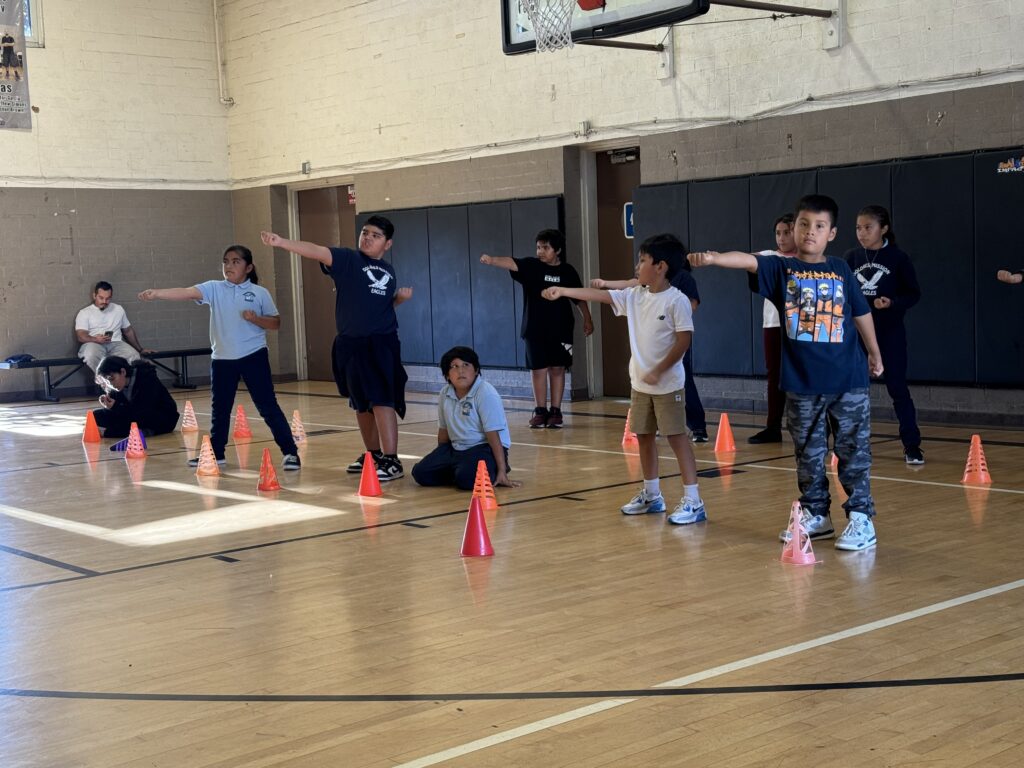
In a world pulsating with the heartbeat of a mental health crisis, where stress mounts, anxiety looms, and the pursuit of well-being feels like an uphill battle, there exists a sanctuary—a space where the mind and body harmonize, where focus sharpens, and the concept of mental/emotional resilience takes root.
Martial arts, in its ancient wisdom, rekindles a profound modern connection, a connection that quiets the cacophony of everyday life as it clamors for our attention. While our personal goals and priorities often go unheard due to the overwhelming expectations many of us experience, the call to unify these disconnected fragments of mind and body is inherent within the realm of martial arts.
The allure of this training lies not just in the fluid motion of a well-executed strike or form, but in the profound understanding that every movement intertwines the threads of mental fortitude and physical ability. It’s here, within this fusion of art and discipline, that the gateway to mental well-being unfolds.
Let’s unravel the secrets that lie within this union—secrets that unlock not just physical fitness, but a resilient mind, an indomitable spirit, and a “home grown” sanctuary amid life’s most raging storms.
In this first part of our 3-part series, we are going to dive deep into the foundational elements of martial arts—the mind-body connection, the art of focus and discipline, and how these pillars form the bedrock of mental resilience.
The Importance of Mental Health/The Mind-Body Connection
While many of us can say that we understand the importance of a healthy mind, very few understand the deep-seated implications of one who is struggling with their mental health.
According to the National Alliance on Mental Illness (2023), the ramifications of dwindling mental health reach far and wide:
- People with depression have a 40%higher risk of developing cardiovascular and metabolic diseases than the general population. People with serious mental illness are nearly twice as likely to develop these conditions.
- 5%of U.S. adults with mental illness also experienced a substance use disorder in 2021 (19.4 million individuals).
- The rate of unemployment is higher among U.S. adults who have mental illness (4%) compared to those who do not (4.6%)
- High school students with significant symptoms of depression are more than twice as likelyto drop out compared to their peers.
- Students aged 6-17 with mental, emotional or behavioral concerns are 3x more likelyto repeat a grade.
Evident in these statistics, a suffering mental health state can not only filter into an individual’s physical body but can negatively affect their career, relationships, education, etc. and can in some cases, result in substance abuse.
 Some of the deterrents to seeking help when suffering through a mental health crisis is not only the stigma attached to it, but the price tag. The World Health Organization estimates that the annual costs of mental health care across the globe tops out around 2.5 trillion dollars (Moore, Dudley, & Woodcock, 2019). Because of the exorbitant costs that are out of reach for many, it’s vital to promote a comprehensive, holistic approach that doesn’t financially drain those seeking help.
Some of the deterrents to seeking help when suffering through a mental health crisis is not only the stigma attached to it, but the price tag. The World Health Organization estimates that the annual costs of mental health care across the globe tops out around 2.5 trillion dollars (Moore, Dudley, & Woodcock, 2019). Because of the exorbitant costs that are out of reach for many, it’s vital to promote a comprehensive, holistic approach that doesn’t financially drain those seeking help.
Unlike many other sports/physical activity, martial arts have a very different foundation rooted in discipline, respect, and self-control. Additionally, they are inherently effective at encouraging emotional regulation and self-awareness.
“Martial arts training could be viewed as a sports-based mental health intervention that potentially provides an inexpensive alternative to psychological therapy” (Moore, Dudley, & Woodcock, 2019).
Utilizing these skills (discipline, respect, and self-control to name a few) to elevate one’s mental condition is a natural byproduct of training in martial arts. As a student practices the same movements repeatedly, they learn to persist … even through adversity, seeking to be better than they were yesterday. As they learn increasingly difficult forms, they must adjust to the frustration they may experience by regulating their emotions and utilizing self-control. These, of course, are just two examples but illustrate the seamless interconnection between martial arts training and a healthy mind/body relationship.
The existing evidence that supports the effectiveness of martial arts training for mental/emotional health is intriguing – and it’s important to emphasize the value of a few of these core concepts.
Building Discipline, Focus, and Mental Resilience
At the core of martial arts practice lies the development of discipline—an unwavering commitment to success and consistent improvement.
The structured nature of martial arts training instills a sense of routine and dedication. It’s vital that students adhere to their own personal schedule, honing techniques through repetitive practice, and remembering to embrace the philosophy of discipline as a valuable, guiding principle. This consistent dedication not only refines their physical abilities but also positively affects their daily life, fostering habits of perseverance and self-control. This mental discipline instilled in martial arts training becomes a cornerstone upon which individuals build their approach to personal goals, challenges, and even setbacks.
In addition, self-discipline teaches students the importance of responsibility for their actions. “Being accountable is not easy, and it requires a humble spirit that is not afraid to be honest or vulnerable” (Thrive Global, 2024). Climbing the ladder of belt ranks within martial arts can be humbling – and more importantly, it is a lesson in accountability. Because martial arts are an individual sport, a student is fully accountable to themselves for their success.
 Within the realm of discipline also lies the ability to reach and maintain focus. Martial arts practitioners learn to channel their attention with laser-like precision, focusing on the intricacies of movement and strategy. Through exercises in mindfulness and concentration, individuals sharpen their ability to remain present in the moment, shutting out external noise and internal doubts.
Within the realm of discipline also lies the ability to reach and maintain focus. Martial arts practitioners learn to channel their attention with laser-like precision, focusing on the intricacies of movement and strategy. Through exercises in mindfulness and concentration, individuals sharpen their ability to remain present in the moment, shutting out external noise and internal doubts.
This heightened focus not only enhances performance within the field of martial arts but also permeates into daily tasks, providing a pathway to navigate complexities with clarity and a calm mind. Partnered with a strong sense of self-discipline, students can rely on themselves to maintain composure during adversity – a valuable life skill inside and outside the dojo.
Finally, martial arts, by its nature, demands resilience. Facing challenges, setbacks, and sometimes even failure during training becomes a catalyst for mental toughness. Students must learn to embrace adversity, understanding that setbacks are not defeats but opportunities for growth and improvement. The constant push to surpass personal limits and confront difficulties instills a resilient mindset that applies outside the world of martial arts. This mental resilience equips individuals with the ability to bounce back from life’s trials, fostering adaptability and a steadfast spirit in the face of adversity.
In essence, martial arts embody a holistic approach to mental well-being, fostering discipline, focus, and mental resilience that extend far beyond the confines of a training session, creating a blueprint for a balanced and resilient mind.
The importance of a solid foundation of mental health cannot be overstated; statistics prove that mental health is often overlooked and the ramifications from ignoring it are far reaching (NAMI, 2023). With the increasing challenges that many of us face day to day, it’s vital to possess the skills to cope with adversity through discipline, focus, and mental resilience.
A strong mind-body connection achieved through martial arts practice is an invaluable tool to combat feeling overwhelmed with life’s daily challenges. As stressors vie for attention, the serene clarity attained through martial arts training becomes an anchor, grounding practitioners in the present moment.
In Part 2 of our “Mind Over Matter: Mental Well-Being Through Martial Arts” blog, we’ll address the strategies and techniques to achieve and maintain mental wellness. Learning the art of stress management, building your confidence and self-esteem, and honing your ability to maintain emotional control is the second group of lessons to this comprehensive education in achieving true mental well-being through martial arts.
References
Infographic courtesy of:
Mental Health by the Numbers. (2023). National Alliance on Mental Illness. Retrieved from https://www.nami.org/mhstats
Moore, B., Dudley, D. & Woodcock, S. The effects of martial arts participation on mental and psychosocial health outcomes: a randomized controlled trial of a secondary school-based mental health promotion program. BMC Psychol 7, 60 (2019). https://doi.org/10.1186/s40359-019-0329-5
Thrive Global. (2024). The Importance of Discipline in Martial Arts. Retrieved from https://community.thriveglobal.com/the-importance-of-discipline-in-martial-arts/






